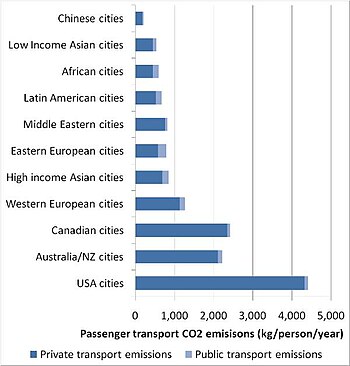 |
| English: Graph of CO2 emissions by city for the year 1995. Graph created by me from data published in Kenworthy, JR (2002) Transport Energy Use and Greenhouse Gases in Urban Passenger Transport Systems: A Study of 84 Global Cities / Millennium Cities Database UITP KENWORTHY JR* (Photo credit: Wikipedia) |
Today we review a paper that examines the trend toward increased urban car use, the consequences in terms of greenhouse gas emissions, and the opportunities that exist to reduce these emissions. Under the “high shift” scenario, urban transportation emissions could be reduced by 40% world-wide with savings of $100 trillion in operating and infrastructure costs. Putting more funding into public transit is not necessarily the best way to make these savings, but rather investments to promote cycling and walking.
Key Quotes:
“If the world's cities focused their investments on expanding public transportation, walking and cycling, they could save more than $100 trillion in public and private capital and urban transportation operating costs between now and 2050”
“In a "high shift" scenario with far greater urban passenger travel by clean public transport and non- motorized vehicles … roughly 1.7 gigatons of carbon dioxide could be eliminated each year—a 40 percent reduction in urban passenger transport emissions—by 2050.”
"Transportation, driven by rapid growth in car use, has been the fastest-growing source of CO2 in the world….While every part of the global economy needs to become greener, cleaning up the traffic jams in the world's cities offers the least pain and the most gain."
“Transportation emissions in China… are expected to mushroom in the coming decades, from less than 200 megatons of CO2 annually today to nearly 1,200 megatons of CO2 in 2050…India will also see a huge jump in urban transportation emissions, from about 70 megatons of CO2 today to more than 500 megatons in 2050.”
"Unmanaged growth in motor vehicle use threatens to exacerbate growing income inequality and environmental ills, while more sustainable transport delivers access for all, reducing these ills,"
“mass transit is a day dream, fostered by politicians…the trains are rarely full, and are less efficient than autos, and because people have to be transported to and from the system, and once at their destination, must be transported by other means, mass transit almost always INCREASES Greenhouse Gas emissions. And when you rank mitigation projects by dollars invested vs CO2 emissions reduced, mass transit doesn't even make the list, it's so terrible.”
"I must admit there's a question about whether business as usual is even plausible, because many cities are going to run into infrastructure constraints and space constraints at some point…But that is the trend, the trend is such fast motorization rates that if nothing is done to try and redirect that, it looks like a very unsustainable future."






No comments:
Post a Comment